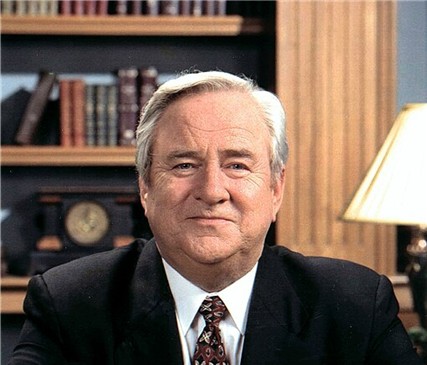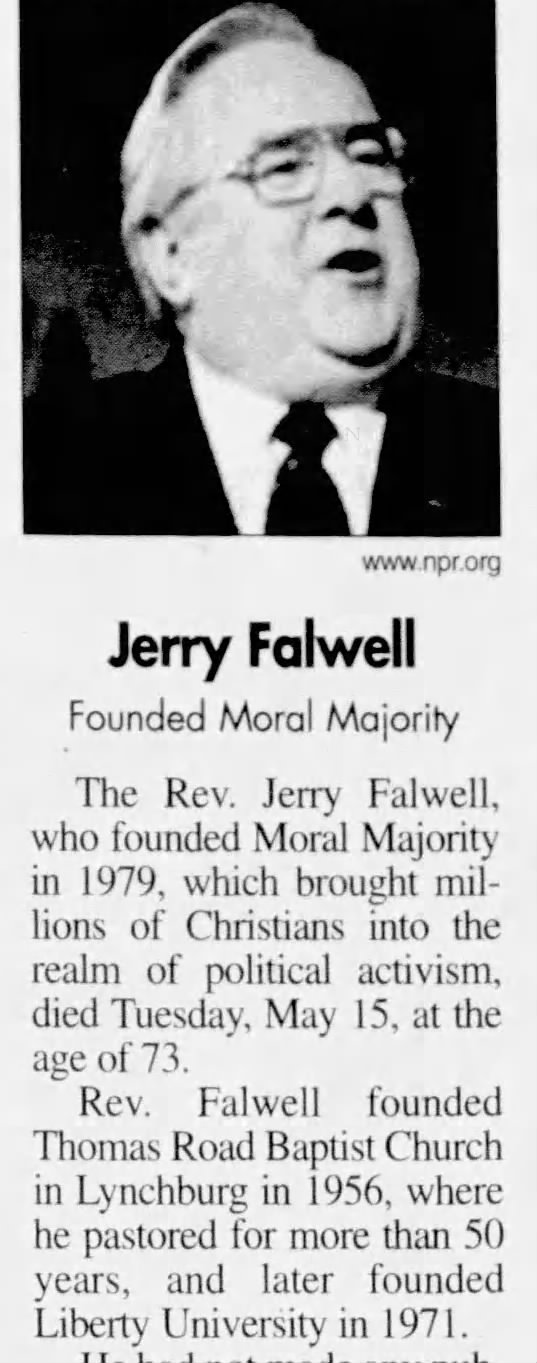Jerry Laymon Falwell Sr.
“Nothing of spiritual significance comes without sacrifice. Your spirituality will always be measured by the size of your sacrifice.”
(Jerry Laymon Falwell Sr.)
Jerry Laymon Falwell Sr.
Jerry Laymon Falwell Sr. (born August 11, 1933 – died May 15, 2007) was a towering figure in modern American evangelicalism. His influence spanned pulpit, media, education and politics. He founded the Thomas Road Baptist Church in Lynchburg, Virginia, started the media ministry known as the The Old‑Time Gospel Hour, launched Liberty University and played a central role in the birth of the conservative Christian political movement through the Moral Majority. His life and legacy are complex—praised by many for his vision and mobilization of evangelicals, criticized by others for his early positions on civil-rights and social issues—but nonetheless central to understanding late 20th-century Christianity in America.
Early Life and Call
Jerry Falwell was born in Lynchburg, Virginia, to Carey and Helen Falwell. His upbringing was not in a devout Christian home; his grandfather had been an atheist, and his father struggled with alcoholism. In January 1952, at the age of 18 or 19, Falwell experienced a conversion to Christianity at Park Avenue Baptist Church in Lynchburg. He later enrolled at Baptist Bible College in Springfield, Missouri, and in 1956, after graduating, turned to full-time pastoring.
In 1956 he founded Thomas Road Baptist Church with just 35 members. Over the ensuing decades, under his leadership, the congregation grew into a multi-thousand-member megachurch. Meanwhile, he began a radio ministry, The Old-Time Gospel Hour, within weeks, and six months later expanded into television.
Building Institutions & Media
Falwell was not content merely to preach. He had a keen sense for institutional and media strategy. At Thomas Road he developed a campus ministry, day school component and wide-reaching programs. Through his media work, his voice reached nationally and internationally.
In 1971 he founded Liberty Baptist College (which later became Liberty University). He envisioned a place for “thousands of young men and women, deeply in love with the Lord Jesus Christ, who will go out in all walks of life to shake this world for God.” The university would become one of the largest evangelical Christian universities in the United States, playing a pivotal role in training Christian leaders, ministers, educators and professionals committed to his vision.
Falwell also launched social service initiatives—such as a home for men dealing with chemical addictions, a maternity home for unwed mothers, prison outreach—through the church and related ministries. A U.S. Congressional resolution noted these as part of his community-impact legacy.
Entry into Politics: The Moral Majority
One of the most significant and controversial elements of Falwell’s legacy is his role in mobilizing evangelical Christians into political engagement. In 1979 he founded the Moral Majority, which sought to bring socially conservative Christian values into public life—promoting opposition to abortion, feminism, gay rights, and championing the “family,” “life,” and traditional moral order.
The organization grew quickly, at one point claiming millions of members, and is widely credited with helping to propel Ronald Reagan to the presidency in 1980. Falwell declared the Moral Majority “accomplished its mission” and formally disbanded it in 1989, though its influence on evangelical political identity lives on.
Controversies and Evolution
Falwell’s ministry was marked by controversies. In the 1960s he opposed school desegregation efforts, labelled the civil-rights movement “the civil wrongs movement,” and hosted segregationist speakers. These early stances drew considerable criticism and continue to cloud assessments of his legacy. Later in his career, he publicly recanted some of his earlier positions and acknowledged changes in his thinking.
He also made abrasive comments about homosexuality, feminism, and other topics which many perceived as intolerant. Yet his supporters argue that his core commitment was to what he saw as biblical truth, not political expediency.
Legacy and Impact
When Falwell died in May 2007 at the age of 73 (of cardiac arrhythmia) in Lynchburg, Virginia, he left behind a broad and deeply influential legacy. Some of the key elements of his legacy include:
- Institutional legacy: Thomas Road Baptist Church remains a large and influential congregation; Liberty University has grown into one of the largest Christian universities in America, offering extensive academic programs and producing thousands of alumni serving around the world.
- Media and communication: The Old-Time Gospel Hour model helped shape how evangelical voices engaged mass media. Falwell was an early adopter of TV and radio to extend church influence beyond the pulpit.
- Political engagement of evangelicals: Perhaps his most lasting influence is the transformation of evangelical Christianity in America into a political force. The Moral Majority and similar efforts helped define the ‘religious right’ and established patterns of evangelical involvement in elections, public policy and social issues.
- Social service and local outreach: Despite the emphasis on national politics, Falwell’s ministry also addressed local needs—addiction, unwed mothers, education in Lynchburg. His U.S. congressional resolution cited this aspect of his work.
Practical Lessons
From Falwell’s life, several lessons emerge:
- Vision plus institution equals influence: Falwell married preaching with institution-building to produce lasting structures (church, school, media).
- Media matters: The early adoption of radio and television multiplied impact.
- Changing society meets organized faith: His political mobilization shows how religious movements can shift public life—but also how they face critique when merging religious and political identity.
- Legacy is mixed: His early positions on race and social issues serve as reminders that even influential leaders have blind spots—and that change is always possible.
- Enduring institutions carry influence long after a leader is gone: The structures he built continue to shape evangelicalism long past his death.
Conclusion
Jerry Laymon Falwell Sr. was a man of his era—a preacher, educator, activist, institution-builder—and his imprint remains deep. He defined much of what evangelical Christianity looks like in America today: megachurches, Christian universities, media ministries, and political activism. He also embodied the tension of ministry in a changing society—early resistance to desegregation, later engagements with public life and media, and the ever-present challenge of staying true to convictions while adapting to new realities.
Whether one views him primarily as a visionary leader or as a polarizing figure, there is no denying that Falwell’s work changed the landscape of American religion. For believers and students of church history alike, his life offers a case study in the possibilities and pitfalls of faith engaged in public life and reminds us that every legacy carries both light and shadow.
_____
Image Source/Credit (in order):
- Liberty University, CC BY-SA 3.0 <http://creativecommons.org/licenses/by-sa/3.0/>, via Wikimedia Commons
- Newspapers.com, The Virginia Gazette, May 16, 2007, https://www.newspapers.com/article/the-virginia-gazette/191132672/
Related
Sorry, no records were found. Please adjust your search criteria and try again.
Sorry, unable to load the Maps API.

